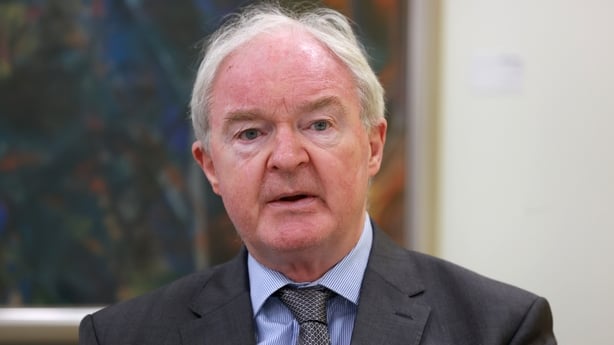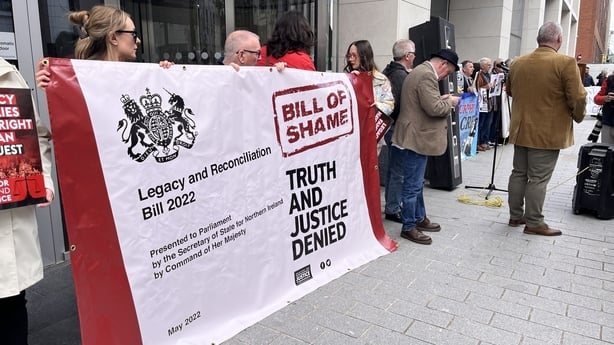Ten families have asked Northern Ireland's new legacy body to investigate incidents which led to the death or serious injury of their loved ones during the Troubles.
One of the first is into the Guildford pub bombings in England in October 1974.
The Independent Commission for Reconciliation and Information Recovery (ICRIR) was established under the British government's controversial Legacy Act.
The commission has revealed that since it became operational in May it has been approached by 85 members of the public to see whether it can investigate their cases.
Ten formal requests for investigations have been made and eight are under way.
Four soldiers and a civilian were killed in the Guildford bombings and 65 people were injured when the IRA planted bombs in two pubs frequented by British soldiers in the Surrey town in 1974.
The dead were aged between 17 and 21.
The ICRIR body is led by retired judge Declan Morgan, a former lord chief justice for Northern Ireland.
He said the update "reflects the commission's values about being open and accountable, and above all the focus on delivering for those who have come to the commission seeking answers".
Mr Morgan said all at the commission were committed to following the approach that the design framework sets out so the body meets what it has promised.

"We are now at a stage where people have come forward and put their trust in the commission to take their requests forward. We will now do so in line with our values and core principles," he said.
"We are moving into the next phase of our work as the serious and important task of investigation begins.
"In doing this we must meet the commitments that we have made to each person who comes to us, through our open and published policies, and through our trauma and resiliency informed model."
It is estimated that there around 1,000 unsolved murders linked to the Troubles and many more serious injury cases.
The act was introduced by the previous Tory administration.
It ended all existing investigations, cut off access to the criminal and civil courts and guillotined Troubles' era inquests.
It instead offered an information recovery model for those who approached the commission.
The prospect of any criminal convictions from the new system was described by a senior commission official as "vanishingly small".
Nationalists claimed the law's true intention was to protect British army veterans from prosecution for controversial state killings over the decades.
A proposed amnesty for paramilitaries in return for providing information as part of a truth recovery process was also deeply unpopular.

Families of those killed and seriously injured said it did not hold out the prospect of real justice.
The legislation was roundly opposed by victims' groups, politicians in Northern Ireland and the Irish Government.
The new Labour government, which took over after July's UK general election, promised to repeal and replace it.
It has already announced it will reinstate access to the courts and will not appeal a court ruling that the amnesty clause breaches international law.
Campaigners have raised concerns about the independence of the ICRIR and some have called for it to be replaced as part of any new legacy arrangements.
A Belfast court ruled earlier this year that it was capable of carrying out effective investigations that complied with the European Convention of Human Rights.
We need your consent to load this rte-player contentWe use rte-player to manage extra content that can set cookies on your device and collect data about your activity. Please review their details and accept them to load the content.Manage Preferences
A 'significant change'
Tánaiste Micheál Martin said the UK Government's approach to the legacy of Northern Ireland's Troubles was a "significant change" from the previous government.
"I warmly welcome the initiatives and decisions taken already by the Secretary of State Hilary Benn in respect of immunity, inquests and facilitating the return of civil cases," he said.
"I had a very substantive meeting at the weekend with Hilary Benn in respect of legacy. I've tasked my officials to engage with his officials to tease through remaining issues and of course he is engaged in a consultation process with victims' groups and with political parties. I will also again re-engage with victims' groups in respect of navigating the next phase of the agenda which was articulated by the new Labour Government in Britain to repeal and replace the Legacy Act. So, there will be legislative proposals.
"I welcome the Secretary of State's commitment to engaging with the Irish Government in respect of this. It's a significant change from the previous government's approach on legacy.
Speaking at the British Irish Association Conference in Oxford at the weekend, Northern Ireland Secretary Hillary Benn said he was committed to working with the Irish Government to "strengthen the commission".
"Because there is more we can do to address concerns about the commission's independence. To strengthen its powers. And to ensure there is the capacity for effective cooperation with the gardaí over investigations."
Mr Benn is currently consulting with victims' groups about a replacement for the Legacy Act.
A case taken by the Irish Government to the European Court of Human Rights over the UK's legislation remains live.
Prior to its enactment, anyone found guilty of pre-1998 Troubles offences could be sent to jail for a maximum of two years under the terms of the Good Friday Agreement.
Additional reporting PA






